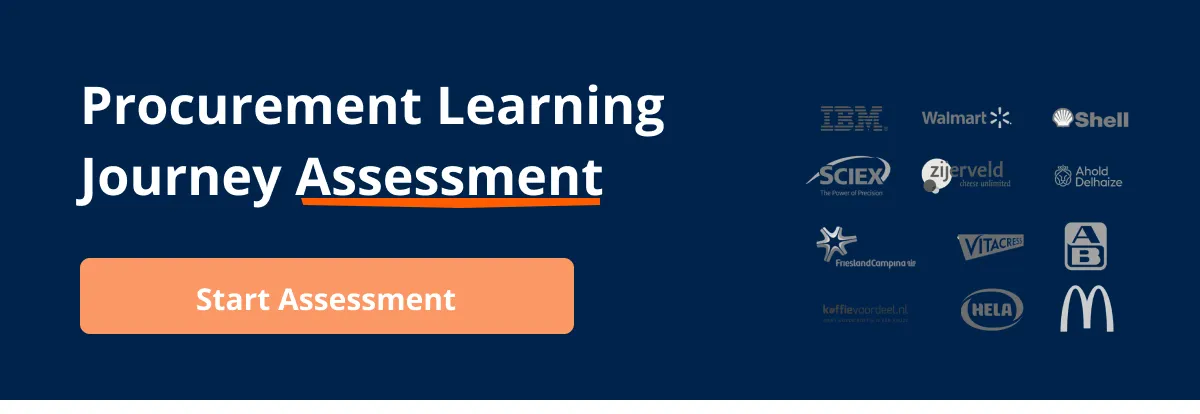ChatGPT & AI in
Procurement Course
Free Preview Lesson

Written by Marijn Overvest | Reviewed by Sjoerd Goedhart | Fact Checked by Ruud Emonds | Our editorial policy
Sustainable Suppliers — Everything About Sustainability
Key take-aways
- Sustainable suppliers are people who provide sustainable materials and products for the company.
- Companies must be guided by their sustainable requirements when selecting a sustainable supplier.
- Sustainable suppliers should meet the environmental, social, and economic standards.
Sustainable suppliers can help companies to achieve sustainability, especially in their procurement activities as they can meet the standards for environmental and social issues. However, how do you select one?
In this article, we will discuss what sustainability means in procurement. We will tell you about sustainable suppliers and how to select one. Additionally, we will share with you how to get a clear idea of your position within the market
Once you are done reading this article, you will have a better knowledge of the role of sustainable suppliers to achieve sustainability within your procurement processes. Also, you will learn how to position your company within the market for sustainable opportunities. So without further ado, let’s start!
Sustainable Procurement: What is it?
Sustainable procurement is about the acquisition of goods and services in an environmentally-friendly manner to fulfill the needs of the company for its daily operation.
In doing this, Companies must integrate CSR concepts into their procurement processes while ensuring a long-term plan to meet demands. By doing this, the aim of sustainability in procurement is to identify and reduce the environmental impacts of the procurement process.
As sustainability is a growing focus in many industries around the world, many businesses are integrating it, especially consumers who are demanding to know where the products they purchase come from. Thus, companies want to be seen as leaders in environmental stewardship.
Additionally, sustainable procurement guarantees that the sustainable values of a company are upheld throughout the product and service life cycle. As a result, it future-proofs the company’s sustainable purchases and investments by integrating sustainable policies.
Importance of Sustainable Procurement
As consumers are becoming aware of how their purchases affect the environment, it is very crucial for every business to reduce its carbon emission footprint to help combat climate change and retain its customers.
Sustainability in procurement allows industries and businesses to be the catalyst in reversing the damage. It shows that businesses are aware of future impacts and consider them when making purchasing decisions.
Also, it can help improve the company’s financials by using the resources efficiently. Thus, nothing will go to waste.
Although sustainability is an increasing trend in procurement, innovation will play a big part in achieving sustainability goals.
Sustainable Suppliers: What Are They?
Sustainable suppliers are people that provide materials and products that meet certain environmental and social standards of a company. Thus, they help you to achieve sustainability by reducing your purchasing impacts through your supply chain.
Suppliers play an essential role in sustainability. For you to achieve your sustainable goals, your suppliers must be fully engaged and understand their role in your sustainability journey.
Thus, it is important to choose your suppliers wisely. Selecting suppliers without evaluating them can pose a big risk for you to achieve sustainability. If they are selling to you unethically sourced materials, then you risk losing your credibility in striving for sustainability.
Selecting a Sustainable Supplier
Selecting a supplier is crucial to the success of your business operations, especially if you are striving for sustainability. Thus, having selection criteria will help you mitigate the risk of selecting unethical and non-compliant suppliers.
In selecting a sustainable supplier, you must be guided by your sustainable requirements. This is where you lay down the rules and guidelines of what you expect from your potential suppliers.
If they can meet your sustainable requirements, then that means that they are adopting sustainability within their operations. Thus, you are assured that what you are purchasing from them is ethically sourced.
Additionally, you may consider using pre-qualification questionnaires to thoroughly check if they can meet your environmental and social standards. Here are some sample questions which we categorized based on the three pillars of sustainability:
Environmental Standards
- Do the suppliers have a certified environmental management system?
- How do these suppliers manage carbon emissions, waste, and water use?
- Are their operations sustainable?
Social Standards
- Do these suppliers comply with national and local laws and legislation?
- Do they comply with fair trade practices?
- What is the health and safety record of their employees?
- What is their policy regarding human rights, working conditions, and fair wages?
Economic Standards
- Do the suppliers have an anti-bribery policy?
- Do they have an anti-corruption policy?
- Have they ever been prosecuted or fined for infringements?
Position as a Purchasing Organization Within the Market
Here’s how to know your position as a purchasing organization within the market.

To get a clear idea of your position as a purchasing organization within the market, you can use these categories as a guide:
- Market mover: It might be possible to considerably influence suppliers or even move markets to a higher level of sustainable behavior, and establish a new standard of best practice in sectors where significant influence and strong ambition exist.
- Best in class: If there is a high desire for sustainability but little impact on the supply market, choosing the current level of best practices will probably produce the most sustainable results.
- Market influencer: There is likely to be little willingness to push the market to a new level where influence is large and ambition is low, but this influence can be utilized to urge supply chains to enhance sustainability practices and outcomes.
- Market taker: The best course of action would be to accept the common sustainability practice that the market offers where influence and ambition are low.
Depending on the purchasing organization’s market influence and sustainability goals, these matrix categories will help assist those in charge of the actual procurement in understanding what sustainable outcomes might be acquired from the supply market.
Do you want to learn more about sustainable suppliers? Then our Sustainable Procurement Course will help you identify, assess, and engage with suppliers effectively. Enroll now!
Procurement Expert’s Advice on Sustainable Suppliers
For this article, we asked an experienced procurement expert to share her insights to help answer common questions about sustainable suppliers.
Joselina Peralta
Founder of STRACTIX
LinkedIn Profile: https://www.linkedin.com/in/joselina-peralta/
1. Why do you think sustainability plays a big role in procurement and supply chains?
“We live in increasingly multipolar economies, where interdependencies are more prevalent. Shifts in how people live, work, & play are structurally heightening post-pandemic. Setting a new economic era; highlighting the relevance of how organizations buy e2e, which in turn determines how organizations configure or reconfigure their supply chain upstream & downstream. From: product design( to increase circularity, reduce carbon footprint, waste gen) ⇒ Plan(when/where/how) ⇒ Invest ⇒ Source(local, regionally, globally, responsible sourcing( how partners operate, align mission, objectives, environmental compliance/standards etc) ⇒ Make ⇒ Deliver ⇒ ⇐ Partnerships( understanding what happens behinds the curtain with Tier2- tier 3,4 in the suppliers, supply chain, from Raw materials that meet new environmental standards/biodegradable to elimination or reduction of secondary packaging, logistics/distro optimization etc. “
2. Are there specific impactful changes should companies choose suppliers that prioritize sustainability rather than other factors like convenience and cost?
“Believe part of the answer is AND, not or. Sustainability is a collective call to action, that we as humanity have answered a bit late. So it’s not discretionary anymore. Hence innovation, Technology, Procurement & Supply Chain are the keys to solving or remedying the impact of not purposefully acting earlier. Part of the selection criteria of the partnership must include what is their sustainability agenda, what is their contribution back to the environment, to the communities in which they currently operate, and how together with you, can both advance the agenda alongside, gross profit, market share, customer experience, etc.”
3. For you, what are the best characteristics or qualities to look for in a sustainable supplier?
“Look for companies who walk the talk consistently, it’s part of their values, ideology, and company lingo!, some of the more formal key characteristics are how they operate their facilities, MFG footprint, Supply Network, what their Environmental considerations, plan, strategy, roadmap? Is it part of their core beliefs? Do they have a social responsibility? How is it demonstrated and reported? What is their governance and compliance structure? What innovation projects are at play or in the pipeline for Sustainable operations(plan/source/make/deliver?)
Do they have long-term sustainability roadmaps with from to by categories of impact and how are they tracking progress? What are their supply Chain Transparency and traceability levels?”
Conclusion
In conclusion, sustainable suppliers are integral to achieving environmental and social goals in procurement. Selecting them wisely ensures ethical sourcing, reduces environmental impacts, and enhances a company’s reputation. As sustainability gains prominence, innovation becomes key in achieving long-term goals.
This article emphasizes the importance of sustainable procurement, outlines the characteristics of sustainable suppliers, and provides guidance on supplier selection and market positioning for organizations striving for sustainability.
Frequentlyasked questions
What is sustainable procurement?
It refers to the acquisition of goods and services in an environmentally-friendly manner to fulfill the needs of the company for its daily operation.
What are sustainable suppliers?
These are people that provide materials and products that meet certain environmental and social standards of a company.
Why is it important to select the right suppliers?
Suppliers have an essential role for you to achieve sustainability. They are the ones that provide you with the materials or services that you use for your daily operations. Thus, if you fail to choose an appropriate supplier, then you will fail to achieve sustainability in your business operations.
About the author
My name is Marijn Overvest, I’m the founder of Procurement Tactics. I have a deep passion for procurement, and I’ve upskilled over 200 procurement teams from all over the world. When I’m not working, I love running and cycling.


